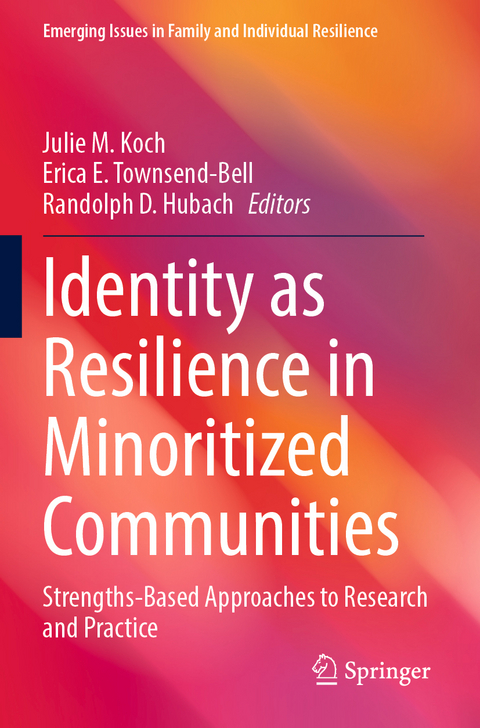
Identity as Resilience in Minoritized Communities
Springer International Publishing (Verlag)
978-3-031-38979-5 (ISBN)
This book examines strengths-based approaches to understanding and celebrating diverse populations. It centers on understanding the ways in which minoritized group identities and membership in such communities can serve as sources of strength. The volume explores the varied dimensions of minoritized identities and challenges traditional concepts of what it means to be resilient. It presents research-based and innovative strategies to understand more thoroughly the role of resilience and strengths in diverse populations and families. The book addresses the need to consider affirmative, liberation, and strengths-based models of resilience.
Key areas of coverage include:
- Families of transgender and gender diverse people.
- The role of chosen family in LGBTQ communities.
- Latinx LGBTQ families.
- The Indian Child Welfare Act.
- Celebration of Black girl voices.
- Homeschooling as a resilience factor for Black families.
- Black identity and resilience related to mental health.
- Black resilience in families.
Identity as Resilience in Minoritized Communities is a must-have resource for researchers, professors, and graduate students as well as clinicians and related professionals in developmental psychology, family studies, clinical child and school psychology, cultural psychology, social work, and public health as well as education policy and politics, behavioral health, psychiatry, and all related disciplines.
Julie M. Koch, PhD, LHSP (she/they) is a Professor of Counseling Psychology in the Department of Psychological & Quantitative Foundations at the University of Iowa. Before joining the University of Iowa, she was Professor and Head of the School of Community Health Sciences, Counseling and Counseling Psychology at Oklahoma State University. Dr. Koch was a Fulbright Specialist to the Mongolia LGBT Centre in 2015, is a past American Psychological Association representative to the International Psychology Network on LGBT Issues, and has served on the American Psychological Association Committee for Global Psychology and Committee on Women in Psychology. Her interests include multicultural competence, training, and development of faculty and counseling psychologists; human rights and social justice; LGBTQ mental health and affirmative practice, especially in rural and international settings; prevention; and microaffirmation.
Erica E. Townsend-Bell, PhD (she/her/ella) is Associate Professor of Political Science, and Director of the Center for African Studies at Oklahoma State University. Dr. Townsend-Bell currently serves as a board member of the American Political Science Association's flagship journal, The American Political Science Review. She previously served as a member of the APSA Committee on the Status of Women, and as program section chair for the Western Political Science Association and Midwest Political Science Association annual conferences. Her areas of expertise include the politics of intersectionality, comparative race and gender politics, and social movements, especially across the Americas.
Randolph D. Hubach, PhD, MPH (he/him) is an Associate Professor of Public Health and the Director of the Sexual Health Research Lab at Purdue University. Early in his career, Dr. Hubach's research and practice experiences included serving as PI on a federally fundedcommunity-based sexual health intervention project, developing managed care programs for local public health and mental health jurisdictions, and serving in leadership positions in multiple community health coalitions and planning processes. As a behavioral scientist and public health researcher, he has gained a practical understanding of the challenges associated with the delivery of public health programs that are scientifically sound and responsive to the needs of diverse communities. Dr. Hubach's research program focuses on three key areas: 1) HIV prevention and care; 2) LGBT health disparities; and 3) rural health and the intersection of these three areas.
Chapter 1. Queer and Trans Resilience: Moving from Affirmation to Liberation in Our Collective Healing.- Chapter 2. Families of Transgender and Gender Expansive Persons: Support, Acceptance, Resilience, and Advocacy.- Chapter 3. Building a Family: An Exploration of Queer Resilience Through the Formation of Family.- Chapter 4. Latinx LGBTQ People and Their Families: The Role of Latinx Cultural Values, Beliefs, and Traditions.- Chapter 5. Promoting Resilience and Reclaiming Black Girl Voice: I'm That Girl.- Chapter 6. American Indian Identities and the Indian Child Welfare Act of 1978 (ICWA) and Cultural Resilience Theory.- Chapter 7. The Legacy of Resilience Embedded in African American Homeschooling.- Chapter 8. Black Identity and Resilience as the Framework for Black Mental Health Research and Practice.- Chapter 9. Understanding African American Family Resilience in the Context of Racial Trauma.
| Erscheinungsdatum | 19.09.2024 |
|---|---|
| Reihe/Serie | Emerging Issues in Family and Individual Resilience |
| Zusatzinfo | XXIII, 129 p. 3 illus., 2 illus. in color. |
| Verlagsort | Cham |
| Sprache | englisch |
| Maße | 155 x 235 mm |
| Themenwelt | Geisteswissenschaften ► Psychologie ► Entwicklungspsychologie |
| Schlagworte | African American homeschooling, inequity, resilience • American Indian/Alaska Native, resilience, strength • Black girls, resilience, social identity • Black mental health, strengths, resilience • College students, LGBTQ+, resilience, community • Development, children, resilience • Families, gender, acceptance, resilience • Family resilience, advocacy, identity • Gender, family, strength, resilience • Indian Child Welfare Act (ICWA), cultural resilience • Intergenerational Transmission of Historical Trauma (ITHxT) • Latinx, LGBTQ, families, culture • LGBTQ+, resilience, identity • Positive development, Black girls • Racial disparity, identity, resilience • Racial trauma, Black families, resilience • Strengths based, resilience, LGBTQ+ • Temperament, children, resilience • Transgender, queer, resilience, strengths • Tribal identities, political status, families |
| ISBN-10 | 3-031-38979-4 / 3031389794 |
| ISBN-13 | 978-3-031-38979-5 / 9783031389795 |
| Zustand | Neuware |
| Haben Sie eine Frage zum Produkt? |
aus dem Bereich


